-
 US suspends green card lottery after MIT professor, Brown University killings
US suspends green card lottery after MIT professor, Brown University killings
-
Arsenal in the 'right place' as Arteta marks six years at club

-
 Sudan's El-Fasher under the RSF, destroyed and 'full of bodies'
Sudan's El-Fasher under the RSF, destroyed and 'full of bodies'
-
From farms to court, climate-hit communities take on big polluters

-
 Liverpool have 'moved on' from Salah furore, says upbeat Slot
Liverpool have 'moved on' from Salah furore, says upbeat Slot
-
Norway crown princess likely to undergo lung transplant

-
 Iraq negotiates new coalition under US pressure
Iraq negotiates new coalition under US pressure
-
France's budget hits snag in setback for embattled PM

-
 Putin hails Ukraine gains, threatens more, in annual press conference
Putin hails Ukraine gains, threatens more, in annual press conference
-
US suspends green card lottery after Brown, MIT professor shootings

-
 Chelsea's Maresca says Man City link '100 percent' speculation
Chelsea's Maresca says Man City link '100 percent' speculation
-
Dominant Head moves into Bradman territory with fourth Adelaide ton
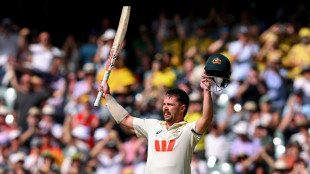
-
 Arsenal battle to stay top of Christmas charts
Arsenal battle to stay top of Christmas charts
-
Mexican low-cost airlines Volaris and Viva agree to merger

-
 Border casinos caught in Thailand-Cambodia crossfire
Border casinos caught in Thailand-Cambodia crossfire
-
Australia's Head slams unbeaten 142 to crush England's Ashes hopes
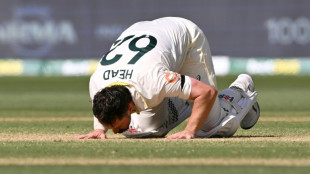
-
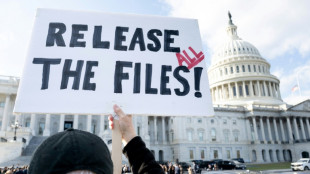 Epstein files due as US confronts long-delayed reckoning
Epstein files due as US confronts long-delayed reckoning
-
'Not our enemy': Rush to rearm sparks backlash in east Germany

-
 West Indies 110-0, trail by 465, after Conway's epic 227 for New Zealand
West Indies 110-0, trail by 465, after Conway's epic 227 for New Zealand
-
Arsonists target Bangladesh newspapers after student leader's death

-
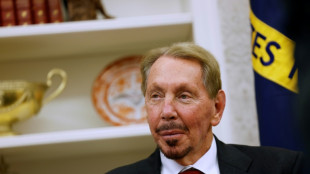 Volatile Oracle shares a proxy for Wall Street's AI jitters
Volatile Oracle shares a proxy for Wall Street's AI jitters
-
Tears at tribute to firefighter killed in Hong Kong blaze

-
 Seahawks edge Rams in overtime thriller to seize NFC lead
Seahawks edge Rams in overtime thriller to seize NFC lead
-
Teenager Flagg leads Mavericks to upset of Pistons

-
 Australia's Head fires quickfire 68 as England's Ashes hopes fade
Australia's Head fires quickfire 68 as England's Ashes hopes fade
-
Japan hikes interest rates to 30-year-high

-
 Brazil's top court strikes down law blocking Indigenous land claims
Brazil's top court strikes down law blocking Indigenous land claims
-
Conway falls for 227 as New Zealand pass 500 in West Indies Test

-
 'We are ghosts': Britain's migrant night workers
'We are ghosts': Britain's migrant night workers
-
Asian markets rise as US inflation eases, Micron soothes tech fears

-
 Giant lanterns light up Christmas in Catholic Philippines
Giant lanterns light up Christmas in Catholic Philippines
-
TikTok: key things to know
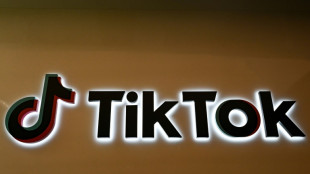
-
 Putin, emboldened by Ukraine gains, to hold annual presser
Putin, emboldened by Ukraine gains, to hold annual presser
-
Deportation fears spur US migrants to entrust guardianship of their children

-
 Upstart gangsters shake Japan's yakuza
Upstart gangsters shake Japan's yakuza
-
Trump signs $900 bn defense policy bill into law

-
 Stokes's 83 gives England hope as Australia lead by 102 in 3rd Test
Stokes's 83 gives England hope as Australia lead by 102 in 3rd Test
-
Go long: the rise and rise of the NFL field goal

-
 Australia announces gun buyback, day of 'reflection' after Bondi shooting
Australia announces gun buyback, day of 'reflection' after Bondi shooting
-
New Zealand Cricket chief quits after split over new T20 league

-
 England all out for 286, trail Australia by 85 in 3rd Test
England all out for 286, trail Australia by 85 in 3rd Test
-
Australian announces gun buyback, day of 'reflection' after Bondi shooting

-
 Joshua takes huge weight advantage into Paul fight
Joshua takes huge weight advantage into Paul fight
-
TikTok signs joint venture deal to end US ban threat
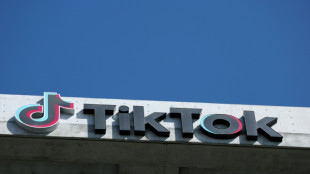
-
 Conway's glorious 200 powers New Zealand to 424-3 against West Indies
Conway's glorious 200 powers New Zealand to 424-3 against West Indies
-
Barnwell Industries, Inc. Reports Results for Its Fourth Quarter and Year Ended September 30, 2025
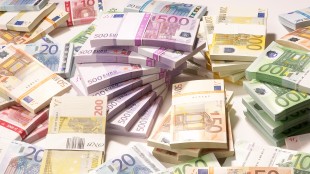
-
 What is the Best Scar Removal Cream for C-section?
What is the Best Scar Removal Cream for C-section?
-
Agronomics Limited Announces Dissolution of Meatable

-
 Agronomics Limited Announces Liberation Bioindustries Series A1 Equity Round
Agronomics Limited Announces Liberation Bioindustries Series A1 Equity Round
-
The European "Anti-Trend" Has Arrived

Trump’s Crackdown: Lives/Risk
In a dramatic push to tackle the skyrocketing cost of prescription drugs in the United States, President Donald Trump has taken decisive action against the pharmaceutical industry. With the stroke of a pen, he signed an executive order designed to slash drug prices, promising relief for millions of Americans burdened by exorbitant healthcare costs. However, this bold move has sparked fierce debate, with critics warning that the consequences could be catastrophic—potentially costing millions of lives due to drug shortages and stifled innovation.
Trump’s Plan to Lower Drug Prices
The executive order, enacted on May 12, 2025, seeks to align U.S. drug prices with those in other developed nations, where medications often cost a fraction of what Americans pay. Trump has long criticized the pharmaceutical industry for what he calls unfair pricing practices, arguing that U.S. consumers have been overcharged for years. The order aims to reduce prices by 30% to 80%, targeting both brand-name and generic drugs. It relies on voluntary compliance from drug companies, with the threat of future regulations looming if they fail to cooperate. For many patients, this could mean significant savings on medications that currently drain their finances.
The Dark Side: Drug Shortages Loom
While the goal of affordability is laudable, the plan has raised red flags among healthcare experts and industry leaders. One major concern is the risk of drug shortages. The U.S. already faces periodic shortages of critical medications, such as those used in cancer treatments and epidurals. Forcing pharmaceutical companies to lower prices could make it unprofitable to produce certain drugs, particularly low-cost generics. If production slows or stops, hospitals and pharmacies could struggle to secure enough supply, leaving patients without access to life-saving treatments. The ripple effect could be devastating, especially for vulnerable populations like cancer patients and the elderly.
A Blow to Innovation
Beyond immediate supply issues, the executive order could deal a severe blow to pharmaceutical innovation. Developing new drugs is an expensive and risky endeavor, often costing billions of dollars and taking years of research. The U.S. market, with its higher drug prices, has long been a key source of revenue for this work. If that revenue shrinks, companies may cut back on research and development, slowing the creation of new treatments for diseases like Alzheimer’s, cancer, and rare genetic disorders. A healthcare economist recently cautioned that such a move could “delay breakthroughs that millions of patients are counting on,” trading short-term savings for long-term losses in medical progress.
Economic Fallout
The economic implications are equally troubling. The pharmaceutical industry employs thousands of Americans and drives significant investment in the U.S. economy. Lower prices could lead to job cuts and reduced funding for new projects. One major drug company has already hinted at rethinking its $50 billion investment in the U.S. if the order takes full effect. While consumers might save money at the pharmacy, the broader economy could suffer as a result.
The Case for Change
Despite these risks, supporters argue that action is overdue. Prescription drug prices in the U.S. are nearly three times higher than in other advanced countries, forcing many Americans to ration their medications or skip doses entirely. Lowering prices could save billions of dollars and improve access for those with chronic conditions like diabetes or heart disease. For these patients, Trump’s order represents a lifeline—a chance to afford the drugs they need to survive.
A High-Stakes Gamble
As the dust settles, the debate rages on. Will Trump’s crackdown on the pharmaceutical industry deliver on its promise of affordable healthcare, or will it unleash a cascade of unintended consequences? The order’s success hinges on cooperation from an industry reluctant to sacrifice profits, and its failure could leave patients paying the ultimate price. For now, the nation watches as this high-stakes gamble unfolds, with millions of lives in the balance.

Studio Kremlin: creative co-working in Paris

Culture: Serbia’s architectural marvels

EU Residence permits: Record level to third nationals

Trump announces Homan as new 'border czar'

EU: How do we deal with Donald Trump?

Watch Live: Trump or Harris? America votes!

Georgia: Ruling party celebrates election victory

Asylum seekers: Return centres – a Solution?

Climate change: A farm in Rotterdam

EU: Overcoming barriers to equality

Germany and its outdated pension system



